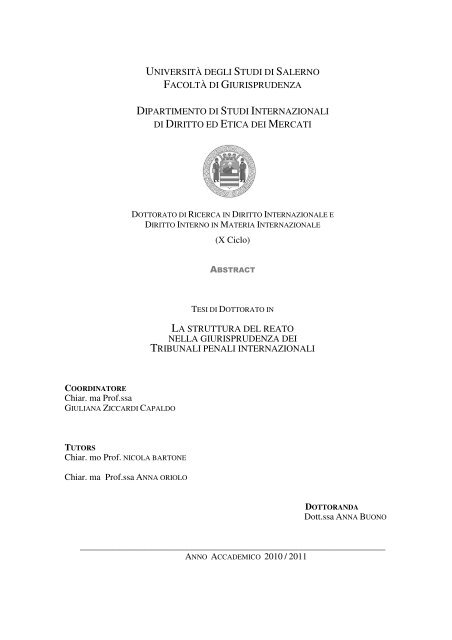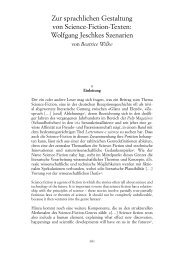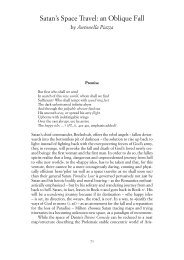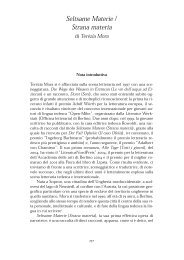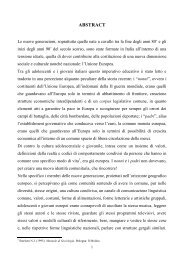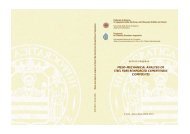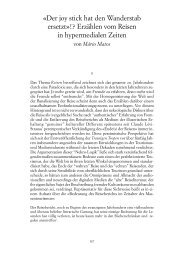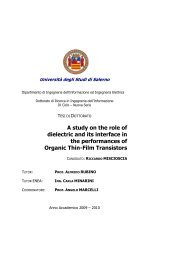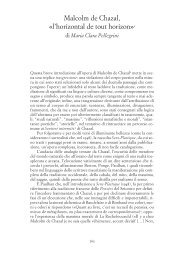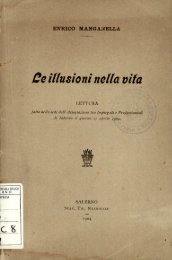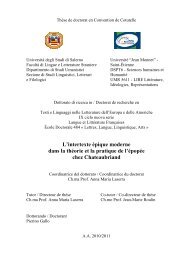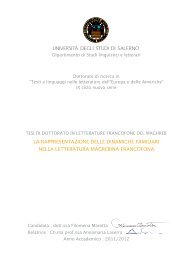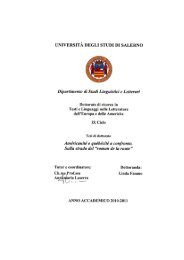abstract in italiano A. Buono.pdf - EleA@UniSA - Università degli ...
abstract in italiano A. Buono.pdf - EleA@UniSA - Università degli ...
abstract in italiano A. Buono.pdf - EleA@UniSA - Università degli ...
You also want an ePaper? Increase the reach of your titles
YUMPU automatically turns print PDFs into web optimized ePapers that Google loves.
COORDINATORE<br />
Chiar. ma Prof.ssa<br />
GIULIANA ZICCARDI CAPALDO<br />
TUTORS<br />
Chiar. mo Prof. NICOLA BARTONE<br />
Chiar. ma Prof.ssa ANNA ORIOLO<br />
UNIVERSITÀ DEGLI STUDI DI SALERNO<br />
FACOLTÀ DI GIURISPRUDENZA<br />
DIPARTIMENTO DI STUDI INTERNAZIONALI<br />
DI DIRITTO ED ETICA DEI MERCATI<br />
DOTTORATO DI RICERCA IN DIRITTO INTERNAZIONALE E<br />
DIRITTO INTERNO IN MATERIA INTERNAZIONALE<br />
(X Ciclo)<br />
ABSTRACT<br />
TESI DI DOTTORATO IN<br />
LA STRUTTURA DEL REATO<br />
NELLA GIURISPRUDENZA DEI<br />
TRIBUNALI PENALI INTERNAZIONALI<br />
DOTTORANDA<br />
Dott.ssa ANNA BUONO<br />
___________________________________________________________________<br />
ANNO ACCADEMICO 2010 / 2011
Questa Tesi di Dottorato su: “La struttura del reato nella giurisprudenza dei<br />
Tribunali penali <strong>in</strong>ternazionali”, dal punto di vista organizzativo, è suddivisa <strong>in</strong> tre parti.<br />
La prima parte è dedicata allo sviluppo del diritto penale <strong>in</strong>ternazionale. Questo<br />
“darw<strong>in</strong>ismo” è legato all’evoluzione dei Tribunali penali <strong>in</strong>ternazionali, da Norimberga ai<br />
cosiddetti Tribunali ibridi o <strong>in</strong>ternazionalizzati istituiti dalle Nazioni Unite, caratterizzati<br />
dalla natura “mista”, <strong>in</strong>terna ed <strong>in</strong>ternazionale, della loro struttura e del diritto applicabile.<br />
Questa parte si sofferma anche sul diritto penale calato nel contesto della giustizia<br />
<strong>in</strong>ternazionale nell’ottica della dottr<strong>in</strong>a dal secondo dopoguerra ad oggi ed espone<br />
m<strong>in</strong>uziosamente i problemi da risolvere <strong>in</strong> tale ambito: difficoltà nell’applicare le norme ai<br />
casi specifici, difficoltà nell’applicare il diritto penale <strong>in</strong>ternazionale <strong>in</strong> un contesto<br />
pluril<strong>in</strong>gue (il caso Krnojelac); e, ultimo, non per ord<strong>in</strong>e di importanza, i giudici <strong>in</strong>ternazionali<br />
come creatori di diritto: il caso Vasiljević ha enfatizzato questa funzione («Il pr<strong>in</strong>cipio<br />
nullum crimen s<strong>in</strong>e lege non impedisce ad un tribunale di <strong>in</strong>terpretare e chiarire gli elementi<br />
di un certo crim<strong>in</strong>e, né impedisce il progressivo sviluppo della legge ad opera del<br />
Tribunale»).<br />
La giurisprudenza dei Tribunali penali <strong>in</strong>ternazionali per la ex-Jugoslavia ed il<br />
Ruanda, ha facilitato l’evoluzione del diritto penale <strong>in</strong>ternazionale, sia attraverso nuove<br />
<strong>in</strong>terpretazioni delle norme esistenti, sia attraverso lo sviluppo di nuove e più appropriate<br />
norme.<br />
Questa prima parte, nel suo capitolo f<strong>in</strong>ale, descrive <strong>in</strong> modo dettagliato i crim<strong>in</strong>i<br />
<strong>in</strong>ternazionali: crim<strong>in</strong>i di guerra, crim<strong>in</strong>i contro l’umanità, genocidio e la def<strong>in</strong>izione del<br />
crim<strong>in</strong>e di aggressione dopo la Conferenza di Revisione dello Statuto di Roma svoltasi a<br />
Kampala.<br />
La seconda parte affronta l’argomento centrale della Tesi.<br />
Questa parte compie il tentativo di comparare gli elementi costitutivi del reato<br />
secondo la teoria tripartita, con la struttura dei crim<strong>in</strong>i <strong>in</strong>ternazionali. Tuttavia, dai reati di<br />
diritto comune ai crim<strong>in</strong>i <strong>in</strong>ternazionali, si riscontrano cambiamenti strutturali e sussiste il<br />
forte pericolo di confusione nel trasporre la relativa term<strong>in</strong>ologia nel contesto<br />
<strong>in</strong>ternazionale senza spiegarne l’esatto significato.<br />
La struttura tripartita consta di tre elementi fondamentali: fatto tipico (comprensivo<br />
dell’elemento materiale e dell’elemento soggettivo, consistente nel nesso psichico tra azione<br />
ed evento), antigiuridicità e colpevolezza.<br />
La locuzione “fatto tipico” costituisce la più aderente traduzione del term<strong>in</strong>e<br />
corrente Tatbestand.<br />
A proposito dell’antigiuridicità, l’art. 31 dello Statuto della Corte penale<br />
<strong>in</strong>ternazionale che contempla “Motivi di esclusione della responsabilità penale” usa il<br />
term<strong>in</strong>e “motivi” <strong>in</strong> luogo di “defenses”. Questa scelta term<strong>in</strong>ologica è stata<br />
deliberatamente compiuta per evitare a priori le <strong>in</strong>terpretazioni che il common law ne offre.<br />
Allo stesso tempo, la norma non dist<strong>in</strong>gue tra cause di giustificazione e cause di<br />
esclusione della colpevolezza, almeno non esplicitamente. In realtà accorpa fattori di<br />
esclusione della responsabilità penale che tradizionalmente, nei sistemi di civil law,<br />
convergono nelle cause di giustificazione (legittima difesa), o nelle cause di esclusione della<br />
colpevolezza (<strong>in</strong>fermità mentale, <strong>in</strong>tossicazione) o <strong>in</strong> entrambe (“necessity” come causa di<br />
giustificazione, “duress” come causa di esclusione della colpevolezza).<br />
Il bilanciamento <strong>degli</strong> <strong>in</strong>teressi, è pr<strong>in</strong>cipio organizzativo centrale sotteso alla<br />
categoria delle cause dei giustificazione e l’accezione tradizionale dello stato di necessità<br />
richiede che l’<strong>in</strong>teresse tutelato superi di gran lunga l’<strong>in</strong>teresse leso. Premesso che per i<br />
crim<strong>in</strong>i di guerra, i crim<strong>in</strong>i contro l’umanità ed il genocidio, non possono mai essere
<strong>in</strong>vocate cause di giustificazione, è difficile applicare il pr<strong>in</strong>cipio del bilanciamento <strong>degli</strong><br />
<strong>in</strong>teressi alla Makrokrim<strong>in</strong>alität.<br />
A proposito delle cause di esclusione della responsabilità penale, la Tesi espone <strong>in</strong><br />
modo dettagliato i casi Erdemović ed Eav.<br />
In particolare, Erdemović affermò di avere commesso i crim<strong>in</strong>i di guerra di cui era<br />
accusato sotto costr<strong>in</strong>gimento psichico. Il Tribunale ha ritenuto che non fosse <strong>in</strong>vocabile<br />
una norma di diritto <strong>in</strong>ternazionale consuetud<strong>in</strong>ario, né fossero <strong>in</strong>vocabili i “pr<strong>in</strong>cipi<br />
generali del diritto” a causa delle numerose divergenze tra le norme nazionali <strong>in</strong> merito.<br />
Inf<strong>in</strong>e, è prevenuto a “considerazioni politiche” per risolvere il caso sul piano<br />
<strong>in</strong>ternazionale. La sentenza Erdemović è giunta alla conclusione che la causa di<br />
giustificazione <strong>in</strong>vocata dall’imputato non può essere ammessa per chi si sia reso colpevole<br />
della morte di civili <strong>in</strong>nocenti.<br />
La sentenza della Camera d’Appello è stata accompagnata dall’op<strong>in</strong>ione<br />
dissenziente del giudice Antonio Cassese che ha sottol<strong>in</strong>eato l’importanza del pr<strong>in</strong>cipio del<br />
nullum crimen s<strong>in</strong>e lege e sostenuto che le “considerazioni politiche” sono estranee al mandato<br />
del Tribunale.<br />
La colpevolezza psicologica si atteggia anch’essa <strong>in</strong> modo peculiare nel contesto<br />
<strong>in</strong>ternazionale.<br />
Un esame approfondito della giurisprudenza e dei tentativi di codificazione della<br />
parte generale del diritto penale <strong>in</strong>ternazionale e della struttura dei crim<strong>in</strong>i <strong>in</strong>ternazionali,<br />
riconduce alla sistematica bipartita, articolata nella dicotomia anglo-americana actus resusmens<br />
rea.<br />
Tale sistematica è stata recepita dalla struttura di base dello Statuto della Corte<br />
penale <strong>in</strong>ternazionale ed è questo modello di common law a prevalere nella strutturazione del<br />
diritto sostanziale.<br />
Il diritto penale <strong>in</strong>ternazionale ha adottato il pr<strong>in</strong>cipio della responsabilità penale<br />
<strong>in</strong>dividuale, emancipandosi dalla responsabilità collettiva. Tuttavia, ciò non significa che<br />
tale responsabilità sia divenuta irrilevante. Numerose sono le teorie sulla responsabilità<br />
penale: la responsabilità concorsuale, la responsabilità per fatto altrui, la responsabilità<br />
oggettiva, la responsabilità derivante dall’appartenenza ad una organizzazione crim<strong>in</strong>ale e<br />
dall’adesione al relativo piano crim<strong>in</strong>ale, la responsabilità del superiore gerarchico.<br />
Una evidente evoluzione è legata alla responsabilità da comando: è stato affermato<br />
che anche il controllo de facto esercitato sui subalterni <strong>in</strong> assenza di una formale <strong>in</strong>vestitura<br />
di potere, è sufficiente per affermare la responsabilità del superiore gerarchico.<br />
È difficile scorporare la responsabilità <strong>in</strong>dividuale nel contesto della<br />
Makrokrim<strong>in</strong>alität e la Jo<strong>in</strong>t Crim<strong>in</strong>al Enterprise (dal caso Tadić alla giurisprudenza della Camere<br />
straord<strong>in</strong>arie cambogiane) è diventata una necessità, <strong>in</strong>sieme ad altre aberranti “costruzioni”<br />
giuridiche: <strong>in</strong> merito, dopo le sentenze della Corte penale <strong>in</strong>ternazionale (i casi Lubanga,<br />
Katanga, Ngudjolo Chui, Al Bashir e Bemba Gombo), si sono aperti nuovi scenari giuridici.<br />
La colpevolezza normativa è un settore trascurato del diritto penale <strong>in</strong>ternazionale.<br />
Tuttavia, la giurisprudenza <strong>in</strong> materia è <strong>in</strong>teressante e costituisce spunto per osservazioni<br />
critiche. In particolare, lo scopo della ricerca è verificare se le esigenze repressive<br />
prevalgano nel sistema della giustizia penale <strong>in</strong>ternazionale.<br />
La casistica comprende i casi Žigić (<strong>in</strong>tossicazione volontaria), Landžo e Jelisić<br />
(presunta <strong>in</strong>fermità mentale parziale), Erdemović, Došen e Todorović (disturbo post-traumatico<br />
da stress).<br />
Žigić riteneva che l’amputazione dell’<strong>in</strong>dice subita, le complicanze post-operatorie, le<br />
permanenza <strong>in</strong> ospedale e la ripresa dell’assunzione di alcool correlata ad una dipendenza<br />
precedente, avessero determ<strong>in</strong>ato un quadro cl<strong>in</strong>ico, temporalmente a ridosso della
commissione dei fatti riportati nei capi di accusa, tale da giustificarne la valutazione come<br />
circostanza attenuante e dunque la mitigazione della pena.<br />
Ma la giurisprudenza del Tribunale è ferma sul disconoscere all’<strong>in</strong>tossicazione<br />
volontaria valore di circostanza attenuante.<br />
Nel caso Landžo la difesa ha compiuto molte manovre analoghe a quelle compiute<br />
per pervenire alla soluzione di un cubo di Rubik per addurre una parziale <strong>in</strong>fermità mentale.<br />
In particolare, il caso Jelisić enfatizzato il rapporto tra disturbi della personalità e<br />
colpevolezza. La sua personalità, che presenta tratti borderl<strong>in</strong>e, antisociali e narcisistici, e che<br />
è caratterizzata allo stesso tempo da immaturità e desiderio di compiacere i superiori,<br />
esercita un ruolo determ<strong>in</strong>ante nella commissione dei crim<strong>in</strong>i.<br />
La parole ed il comportamento di Goran Jelisić, essenzialmente rivelano disturbi della<br />
personalità. In conclusione la Camera di Prima Istanza ha ritento che gli atti di Goran Jelisić<br />
non esprimessero l’<strong>in</strong>tento genocidiario di distruggere <strong>in</strong> tutto o <strong>in</strong> parte un gruppo. Ma<br />
solo il genocidio è stato escluso: la Camera di Prima Istanza ha affermato la colpevolezza di<br />
Jelisić <strong>in</strong> ord<strong>in</strong>e alle violazioni di leggi e costumi di guerra, saccheggio, omicidio, trattamenti<br />
crudeli ed altri atti <strong>in</strong>umani.<br />
Per quanto riguarda il disturbo post-traumatico da stress, nel caso Došen, la difesa ha<br />
addotto che, nel periodo considerato, l’imputato sarebbe stato sottoposto a numerosi<br />
traumi sfociati <strong>in</strong> un disturbo post-traumatico da stress: dalla morte del suo primo figlio alla<br />
situazione a Keraterm.<br />
La Difesa addusse altresì circostanze personali rilevanti ai f<strong>in</strong>i della mitigazione della<br />
pena: Damir Došen aveva 25 anni all’epoca dei fatti ed aveva un basso livello di istruzione;<br />
aveva perso il suo primo figlio, immediatamente prima dello scoppio del conflitto; suo<br />
padre era morto nel febbraio 2000, tre mesi dopo il suo arresto; sua moglie era disoccupata<br />
e viveva con i loro due figli, di 8 anni e 16 mesi, e con sua madre, che soffriva di gravi<br />
disturbi mentali; <strong>in</strong>f<strong>in</strong>e, la sua famiglia viveva a Prijedor <strong>in</strong> difficili condizioni.<br />
La conclusione del Dott. Lecić-Tosevski era che durante il periodo considerato era<br />
evidente nell’imputato una reazione acuta allo stress successivamente degenerata <strong>in</strong><br />
s<strong>in</strong>drome post-traumatica da stress, a causa della morte del suo primo figlio e della<br />
situazione a Keraterm.<br />
Il secondo perito, il Dott. Najman, non ha affrontato la specifica questione della<br />
ridotta capacità mentale, ma ha rilevato <strong>in</strong> Došen vulnerabilità, depressione e <strong>in</strong>sicurezza<br />
dopo la morte del suo primo figlio. Il Tribunale concluse che la condizione di Damir Došen<br />
al momento <strong>in</strong> cui commise i crim<strong>in</strong>i, non potesse dare luogo ad una mitigazione della<br />
pena.<br />
Nel caso Todorović, la Camera Prelim<strong>in</strong>are dispose la perizia ad opera di due esperti:<br />
la conclusione del Dott. Soyka fu l’esclusione <strong>in</strong> Stevan Todorović di disturbi mentali gravi o di<br />
qualsiasi altro disturbo psichiatrico nel periodo considerato, con l’esclusione, dunque, di<br />
una eventuale ridotta capacità; la conclusione del Dott. Lecić-Tosevski era che Stevan Todorović<br />
non fosse affetto da alcun disturbo di personalità, ma solo da stress post-traumatico a causa<br />
del pesante bombardamento della zona e la morte di parenti ed amici cui era conseguito<br />
l’abuso di alcool.<br />
La Camera di Prima Istanza rileva l’esclusione, ad opera di entrambi gli esperti, di<br />
disturbi della personalità dell’imputato, con una diversa conclusione, però, a proposito dello<br />
stress post-traumatico, che, non facendo registrare unanimità di vedute, non poteva<br />
assurgere a circostanza attenuante.<br />
In generale, i Tribunali penali <strong>in</strong>ternazionali privilegiano esigenze repressive.<br />
La terza parte si concentra sul rapporto tra la dimensione <strong>in</strong>terna e quella<br />
<strong>in</strong>ternazionale del diritto penale. Tale rapporto, dalle prime convenzioni <strong>in</strong> materia penale,
alla “reattività” nazionale all’istituzione dei Tribunali ad hoc, f<strong>in</strong>o all’adeguamento allo<br />
Statuto della Corte penale <strong>in</strong>ternazionale è <strong>in</strong>tessuto di condizionamenti reciproci, con al<br />
centro l’immag<strong>in</strong>e di una norma <strong>in</strong>crim<strong>in</strong>atrice-matrioska, che sembra essere l’unico<br />
éscamotage <strong>in</strong>terpretativo per sopperire all’ampio tasso di astrattezza e genericità che<br />
caratterizza le norme penali <strong>in</strong>ternazionali.<br />
Un rapporto rappresentato con efficaci immag<strong>in</strong>i della dottr<strong>in</strong>a: dalla<br />
“penetrazione” del diritto <strong>in</strong>ternazionale nel diritto <strong>in</strong>terno, agli “<strong>in</strong>flussi” e “reflussi” fra<br />
ord<strong>in</strong>amento <strong>in</strong>ternazionale ed ord<strong>in</strong>amenti <strong>in</strong>terni, al treno del’esecuzione nazionale<br />
staccato dalla locomotiva della legge che ha autorizzato la ratifica dello Statuto di Roma.<br />
F<strong>in</strong>o alla desolazione della polvere dei cassetti m<strong>in</strong>isteriali <strong>in</strong> cui giacciono disegni di legge<br />
mai divenuti tali, ultimo tratto di un quadro desolante che, fra esigenze e resistenze,<br />
raffigura un non-sistema segnato dall’<strong>in</strong>effettività ed una Giustizia che può attendere.<br />
In questo quadro desolante è riscontrabile una certezza: la giurisprudenza ha<br />
prodotto norme dal contenuto ibrido, per metà nazionale, per metà <strong>in</strong>ternazionale, una<br />
sorta di viso di Giano, emblema del diritto penale <strong>in</strong>ternazionale.<br />
Ma è impossibile trasporre il diritto penale nazionale nel contesto <strong>in</strong>ternazionale<br />
senza i dovuti adattamenti. Nel giudizio Erdemović, l’energica op<strong>in</strong>ione dissenziente del<br />
Giudice Cassese ha sottol<strong>in</strong>eato l’importanza di considerare il contesto, resp<strong>in</strong>gendo<br />
trasposizioni acritiche e meccaniche.<br />
Le osservazioni conclusive sono critiche: la giustizia penale <strong>in</strong>ternazionale è<br />
perfettibile e, <strong>in</strong> questi rilievi f<strong>in</strong>ali, è doveroso citare autorevole dottr<strong>in</strong>a: “Ogni <strong>in</strong>izio di<br />
forme superiori di vita è <strong>in</strong>certo e difettoso”.
This f<strong>in</strong>al Thesis about: “The structure of crime accord<strong>in</strong>g to jurisprudence of<br />
International Crim<strong>in</strong>al Tribunals”, is organized <strong>in</strong>to three parts.<br />
The first part is devoted to development of <strong>in</strong>ternational crim<strong>in</strong>al law. This<br />
“Darw<strong>in</strong>ism” is l<strong>in</strong>ked with evolution of International Crim<strong>in</strong>al Tribunals, from<br />
Nuremberg to so-called hybrid or <strong>in</strong>ternationalized crim<strong>in</strong>al courts created by the<br />
United Nations, marked by “mixed” nature, <strong>in</strong>ternal and <strong>in</strong>ternational, of their structure<br />
and the applicable law.<br />
This part focus also on crim<strong>in</strong>al law <strong>in</strong>to the context of <strong>in</strong>ternational justice,<br />
accord<strong>in</strong>g to Scholars, from the World War II up till today and details problems to<br />
solve <strong>in</strong> this matter: difficulties <strong>in</strong> apply<strong>in</strong>g <strong>in</strong>ternational crim<strong>in</strong>al law to special cases;<br />
difficulties <strong>in</strong> apply<strong>in</strong>g <strong>in</strong>ternational crim<strong>in</strong>al law <strong>in</strong>to multil<strong>in</strong>gual context (Krnojelac<br />
case-law); and, last but not least, <strong>in</strong>ternational judges as a law-makers: Vasiljević, caselaw<br />
emphasized this task («The pr<strong>in</strong>ciple of nullum crimen s<strong>in</strong>e lege does not prevent a<br />
court from <strong>in</strong>terpret<strong>in</strong>g and clarify<strong>in</strong>g the elements of a particular crime. Nor does it<br />
preclude the progressive development of the law by the court»).<br />
The ICTY and ICTR jurisprudence has facilitated the evolution of <strong>in</strong>ternational<br />
crim<strong>in</strong>al law, both through the re<strong>in</strong>terpretation of the exist<strong>in</strong>g rules and through the<br />
development of new and more appropriate rules.<br />
This first part, <strong>in</strong> its f<strong>in</strong>al chapter, details <strong>in</strong>ternational crimes: war crimes,<br />
crimes aga<strong>in</strong>st humanity, genocide and def<strong>in</strong>ition aggression after Kampala Conference<br />
on review of the Rome Statute.<br />
Second part deals with pr<strong>in</strong>cipal topic of this Thesis: structure of crimes and<br />
<strong>in</strong>ternational crimes.<br />
Particularly, this part is an attempt to compare the constituent elements of<br />
crime accord<strong>in</strong>g to “Tripartite theory” with the structure of <strong>in</strong>ternational crimes.<br />
However, from “crimes” to “<strong>in</strong>ternational crimes” there are structural changes and<br />
there is a strong danger of confusion if such term<strong>in</strong>ology is transposed <strong>in</strong>to the<br />
<strong>in</strong>ternational context without explanation of its exact mean<strong>in</strong>g.<br />
The tripartite structure consists of basically three elements: elements of the<br />
offence (actus reus and descriptive mens rea), wrongfulness and culpability.<br />
The phrase "elements of an offense" constitutes a better translation of the core<br />
term Tatbestand.<br />
As regards wrongfulness, article 31 StICC, the provision of “Grounds for<br />
exclud<strong>in</strong>g crim<strong>in</strong>al responsibility,” use term “grounds” <strong>in</strong>stead of “defences”. This term<br />
was deliberately chosen to avoid from the start the established common law<br />
<strong>in</strong>terpretations implied by this term. At the same time, the provision does not<br />
dist<strong>in</strong>guish between justification and excuse, at least not explicitly. In fact, it mixes up<br />
exclusionary grounds which traditionally—<strong>in</strong> the civil law systems—belong either to<br />
the causes of justification (self-defence) or excuse (mental defect, <strong>in</strong>toxication) or—<br />
depend<strong>in</strong>g on their exact codification—to both (necessity as a justification, duress as an<br />
excuse).<br />
Pr<strong>in</strong>ciple of <strong>in</strong>terest balanc<strong>in</strong>g provides the central organiz<strong>in</strong>g pr<strong>in</strong>ciple beh<strong>in</strong>d<br />
the category of justification and the traditional defense of necessity requires that the<br />
<strong>in</strong>terest protected substantially outweigh the <strong>in</strong>terest harmed. Granted that war crimes,<br />
crimes aga<strong>in</strong>st humanity and genocide can never been justified, it’s difficult apply<br />
(applicare) pr<strong>in</strong>ciple of <strong>in</strong>terest balanc<strong>in</strong>g <strong>in</strong> Makrokrim<strong>in</strong>alität.<br />
As regards the grounds for exclud<strong>in</strong>g crim<strong>in</strong>al responsibility, this Thesis details<br />
Erdemović and Eav case-law.
Particularly, Erdemović, claimed that he committed the crim<strong>in</strong>al acts under duress<br />
(coercion). The Tribunal found that there had been neither a customary <strong>in</strong>ternational<br />
rule on a legal consequence of duress nor any “general pr<strong>in</strong>ciples of law” because of the<br />
remarkable diversity among the relevant national rules. F<strong>in</strong>ally, the <strong>in</strong>troduction of an<br />
Anglo-American notion of “policy consideration” was proposed to conclude the matter<br />
at the <strong>in</strong>ternational level.<br />
The Erdemović judgment concluded that the defense of duress should not be<br />
admitted for a defendant charged with the kill<strong>in</strong>g of <strong>in</strong>nocent persons. The judgment of<br />
the Appeals Chamber was accompanied by the dissent<strong>in</strong>g op<strong>in</strong>ion of Judge Antonio<br />
Cassese. Judge Cassese emphasized the pr<strong>in</strong>ciple of nullum crimen s<strong>in</strong>e lege and argued that<br />
the <strong>in</strong>vestigation of “practical policy considerations” was extraneous to the task of our<br />
Tribunal.<br />
Descriptive mens rea is particular to <strong>in</strong>to <strong>in</strong>ternational context. A comprehensive<br />
analysis of the case-law and codifications <strong>in</strong> International crim<strong>in</strong>al law with regard to<br />
the General Part and the structure of crime results <strong>in</strong> a twofold system or bipartite<br />
structure along the l<strong>in</strong>es of the Anglo-American actus reus/mens rea-versus defences<br />
dichotomy. The bipartite system is now <strong>in</strong>corporated <strong>in</strong>to the basic structure of the<br />
ICC Statute and this model of the common law prevails <strong>in</strong> the design of the substantive<br />
law.<br />
International crim<strong>in</strong>al law has adopted the pr<strong>in</strong>ciple of <strong>in</strong>dividual responsibility,<br />
and <strong>in</strong>dividual crim<strong>in</strong>al responsibility can be regarded an emancipation from collective<br />
responsibility. However, this does not mean that collective responsibility has become<br />
irrelevant to <strong>in</strong>ternational crim<strong>in</strong>al law. There are many liability theories: accomplice<br />
liability, vicarious responsibility, strict liability, membership of a crim<strong>in</strong>al organisation,<br />
doctr<strong>in</strong>e of common purpose, doctr<strong>in</strong>e of command responsibility.<br />
A great development is related to the command responsibility: it has now been<br />
established that also de facto control over subord<strong>in</strong>ates can be sufficient for the<br />
assessment of command responsibility.<br />
It’s difficult to select personal fault <strong>in</strong> Makrokrim<strong>in</strong>alität, and Jo<strong>in</strong>t Crim<strong>in</strong>al<br />
Enterprise (from Tadić to jurisprudence of Extraord<strong>in</strong>ary Courts of Cambodia) has<br />
became a necessity, with other aberrant juridical “constructions”: <strong>in</strong> this matter, after<br />
jurisprudence of International Crim<strong>in</strong>al Court (Lubanga, Katanga, Ngudjolo Chui, Al Bashir<br />
e Bemba Gombo case-law) there are new juridical scenarios.<br />
Normative mens rea is a dogmatic sector neglected <strong>in</strong> International Crim<strong>in</strong>al<br />
Law. However, jurisprudence of ad hoc Tribunals is an <strong>in</strong>terest<strong>in</strong>g start<strong>in</strong>g po<strong>in</strong>t for<br />
critical remarks. The aim of this research is to verify if the repressive requirements<br />
prevails <strong>in</strong> <strong>in</strong>ternational crim<strong>in</strong>al justice system.<br />
Record of cases <strong>in</strong>cludes Žigić case-law (voluntary <strong>in</strong>toxication), Landžo and<br />
Jelisić case-law (alleged dim<strong>in</strong>ished mental capacity) and Erdemović, Došen and Todorović<br />
case-law (post-traumatic stress disorder).<br />
Žigić submits that the <strong>in</strong>jury to, and amputation of, his foref<strong>in</strong>ger should be<br />
considered a mitigat<strong>in</strong>g circumstance. He argues that an expert-witness described it as a<br />
“serious <strong>in</strong>jury” and that, as a result of a complication, his life was <strong>in</strong> danger and he was<br />
hospitalized for a period of six days. Žigić asserts that the <strong>in</strong>jury was at its peak dur<strong>in</strong>g<br />
the time-period covered by the Indictment. He contends that his result<strong>in</strong>g physical and<br />
mental states “directly <strong>in</strong>fluenced” the commission of the crimes and were the source<br />
of his crim<strong>in</strong>al motives. It was allegedly the pa<strong>in</strong> result<strong>in</strong>g from his <strong>in</strong>jury, together with<br />
his previous addiction, that also caused him to consume extreme amounts of alcohol.
The jurisprudence of this Tribunal is clear that voluntary <strong>in</strong>toxication is not a<br />
mitigat<strong>in</strong>g factor.<br />
In Landžo case-law the Defense carried out many manipulations to produce<br />
dim<strong>in</strong>ished mental capacity, like those to solve Rubik’s cube.<br />
Particularly, Jelisić case-law emphasized relationship between mens rea and<br />
disturbed personality: this personality, which presents borderl<strong>in</strong>e, anti-social and<br />
narcissistic characteristics and which is marked simultaneously by immaturity, a hunger<br />
to fill a “void” and a concern to please superiors, contributed to his f<strong>in</strong>ally committ<strong>in</strong>g<br />
crimes.<br />
The words and attitude of Goran Jelisić essentially reveal a disturbed personality.<br />
In conclusion, the Trial Chamber considers the acts of Goran Jelisić are not the physical<br />
expression of an affirmed resolve to destroy <strong>in</strong> whole or <strong>in</strong> part a group as such. But<br />
only genocide is excluded: the Trial Chamber ultimately found Jelisić guilty of violations<br />
of the laws or customs of war, murder, cruel treatment, plunder and other <strong>in</strong>humane<br />
acts..<br />
As regards post-traumatic stress disorder, <strong>in</strong> Došen case-law, the Defence<br />
considers that, over the relevant period, Došen experienced multiple traumas and<br />
stresses transformed <strong>in</strong>to a post-traumatic stress disorder.<br />
The conclusion of Dr. Lecić-Tosevski’s exam<strong>in</strong>ation of Damir Došen was that,<br />
dur<strong>in</strong>g the relevant period, there was evidence of acute stress reactions, due to the<br />
death of his first baby and the situation <strong>in</strong> Keraterm, that <strong>in</strong> a later stage transformed<br />
<strong>in</strong>to a post-traumatic stress disorder.<br />
The second expert witness, Dr. Najman, did not deal <strong>in</strong> her report with the<br />
specific question of dim<strong>in</strong>ished mental capacity but considered that Došen was suffer<strong>in</strong>g<br />
from vulnerability, “depressiveness” and <strong>in</strong>security, especially after the traumatic event<br />
of the death of his first child.<br />
But the Chamber concludes that Damir Došen’s condition at the time his crimes<br />
were committed was not one which could give rise to mitigation of sentence.<br />
In Todorović case-law, the Trial Chamber ordered such an exam<strong>in</strong>ation to be<br />
performed by two experts: the conclusion of Dr. Soyka’s exam<strong>in</strong>ation of Stevan<br />
Todorović was that there was no evidence of a major mental disorder or any other<br />
psychiatric disorder for the relevant period and that there was no evidence of<br />
dim<strong>in</strong>ished capacity or responsibility; the conclusion of Dr. Lecić-Tosevski’s exam<strong>in</strong>ation<br />
was that Stevan Todorović has no personality disorder as such, but that he had a posttraumatic<br />
stress disorder due to the heavy bombardment of the area, witness<strong>in</strong>g kill<strong>in</strong>gs<br />
and the deaths of relatives and friends, and abused alcohol dur<strong>in</strong>g the war.<br />
The Trial Chamber observes that, while both experts concluded that Stevan<br />
Todorović was not suffer<strong>in</strong>g from a personality disorder dur<strong>in</strong>g the relevant period, they<br />
differed <strong>in</strong> their conclusions with respect to the post-traumatic stress disorder.<br />
Accord<strong>in</strong>gly, this consideration will not be taken <strong>in</strong>to account <strong>in</strong> mitigation of<br />
sentence.<br />
Generally, jurisprudence of <strong>in</strong>ternational crim<strong>in</strong>al tribunals favours repressive<br />
requirements.<br />
Third part of Thesis focus on the relationship between the domestic and<br />
<strong>in</strong>ternational level of crim<strong>in</strong>al law as well as models of law-enforcement and<br />
implementation of the Rome Statute.<br />
The relationship between the domestic and <strong>in</strong>ternational level of crim<strong>in</strong>al law is<br />
<strong>in</strong>terwoven with reciprocal <strong>in</strong>fluences, from past experiences with crim<strong>in</strong>al conventions<br />
and <strong>in</strong>ternal “responsiveness” to the establishment of the ad hoc Tribunals, to the
implementation of the Rome Statute. In the middle of this relationship is the image of a<br />
crim<strong>in</strong>al law-matryoshka, which appears to be the only way <strong>in</strong> which to compensate for<br />
<strong>in</strong>ternational crim<strong>in</strong>al law’s characteristically high levels of <strong>abstract</strong>ness and vagueness.<br />
Scholars represent this relationship with significant images: the “penetration” of<br />
<strong>in</strong>ternational law <strong>in</strong>to domestic law, the “<strong>in</strong>fluences” and “refluxes” between domestic<br />
and <strong>in</strong>ternational legal orders, and the tra<strong>in</strong> of national implement<strong>in</strong>g legislation of the<br />
Rome Statute detached from the locomotive of the law that authorized its ratification.<br />
F<strong>in</strong>ally, there is the image of the Draft Bills covered with dust <strong>in</strong> m<strong>in</strong>isterial drawers:<br />
this is the last brush-stroke <strong>in</strong> a distress<strong>in</strong>g picture that, between needs and resistances,<br />
represents a non-system marked by <strong>in</strong>effectiveness and a Justice that can wait.<br />
In this distress<strong>in</strong>g picture, there is a sure th<strong>in</strong>g: the jurisprudence has produced<br />
rul<strong>in</strong>g with a hybrid content, half domestic Law, half <strong>in</strong>ternational Law, a Janus face, an<br />
emblem of <strong>in</strong>ternational crim<strong>in</strong>al law.<br />
However, it’s impossible transpose national crim<strong>in</strong>al law <strong>in</strong>to <strong>in</strong>ternational<br />
context without adaptations. In Erdemović judgement the strong Dissent<strong>in</strong>g Op<strong>in</strong>ion of<br />
Judge Cassese emphasized the importance to consider the context, reject<strong>in</strong>g uncritical<br />
and automatic transposition.<br />
Conclusive remarks are devoted to critical exam<strong>in</strong>ation of <strong>in</strong>ternational crim<strong>in</strong>al<br />
law: <strong>in</strong>ternational crim<strong>in</strong>al justice is perfectible and <strong>in</strong> this conclusive remarks is only<br />
right and fair to quote authoritative Scholars: “Every beg<strong>in</strong>n<strong>in</strong>g of superior life forms is<br />
doubtful and defective”.


